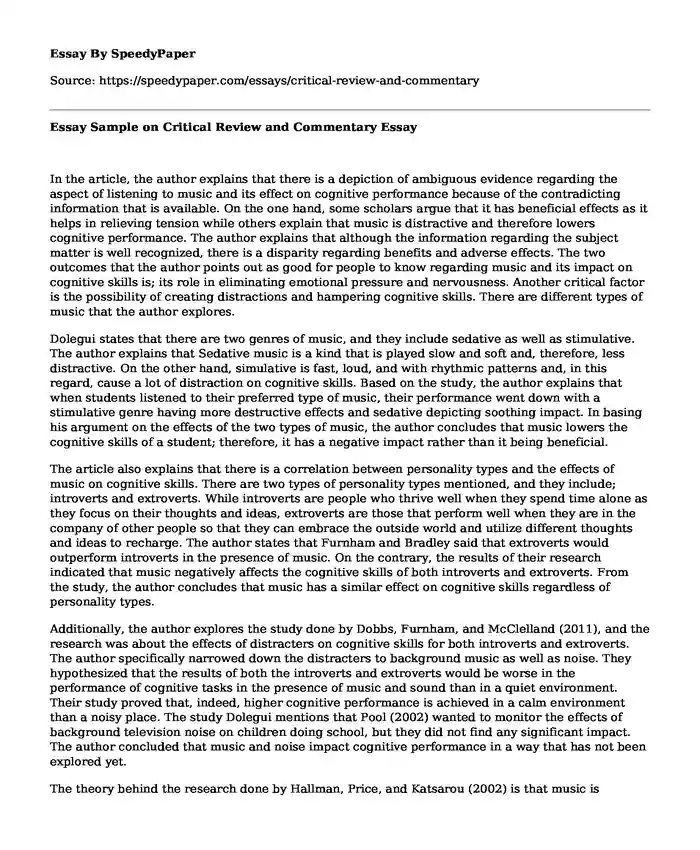
| Essay type: | Cause and effect essays |
| Categories: | Music Intelligence Personal development Cognitive development Essays by pagecount |
| Pages: | 3 |
| Wordcount: | 669 words |
In the article, the author explains that there is a depiction of ambiguous evidence regarding the aspect of listening to music and its effect on cognitive performance because of the contradicting information that is available. On the one hand, some scholars argue that it has beneficial effects as it helps in relieving tension while others explain that music is distractive and therefore lowers cognitive performance. The author explains that although the information regarding the subject matter is well recognized, there is a disparity regarding benefits and adverse effects. The two outcomes that the author points out as good for people to know regarding music and its impact on cognitive skills is; its role in eliminating emotional pressure and nervousness. Another critical factor is the possibility of creating distractions and hampering cognitive skills. There are different types of music that the author explores.
Dolegui states that there are two genres of music, and they include sedative as well as stimulative. The author explains that Sedative music is a kind that is played slow and soft and, therefore, less distractive. On the other hand, simulative is fast, loud, and with rhythmic patterns and, in this regard, cause a lot of distraction on cognitive skills. Based on the study, the author explains that when students listened to their preferred type of music, their performance went down with a stimulative genre having more destructive effects and sedative depicting soothing impact. In basing his argument on the effects of the two types of music, the author concludes that music lowers the cognitive skills of a student; therefore, it has a negative impact rather than it being beneficial.
The article also explains that there is a correlation between personality types and the effects of music on cognitive skills. There are two types of personality types mentioned, and they include; introverts and extroverts. While introverts are people who thrive well when they spend time alone as they focus on their thoughts and ideas, extroverts are those that perform well when they are in the company of other people so that they can embrace the outside world and utilize different thoughts and ideas to recharge. The author states that Furnham and Bradley said that extroverts would outperform introverts in the presence of music. On the contrary, the results of their research indicated that music negatively affects the cognitive skills of both introverts and extroverts. From the study, the author concludes that music has a similar effect on cognitive skills regardless of personality types.
Additionally, the author explores the study done by Dobbs, Furnham, and McClelland (2011), and the research was about the effects of distracters on cognitive skills for both introverts and extroverts. The author specifically narrowed down the distracters to background music as well as noise. They hypothesized that the results of both the introverts and extroverts would be worse in the performance of cognitive tasks in the presence of music and sound than in a quiet environment. Their study proved that, indeed, higher cognitive performance is achieved in a calm environment than a noisy place. The study Dolegui mentions that Pool (2002) wanted to monitor the effects of background television noise on children doing school, but they did not find any significant impact. The author concluded that music and noise impact cognitive performance in a way that has not been explored yet.
The theory behind the research done by Hallman, Price, and Katsarou (2002) is that music is calming and relaxing. The authors went ahead to test this theory through the arithmetic and memory performance of children between the ages of ten and twelve. Their research proved that music is calming and relaxing. As a result, it leads to better cognitive performance as established by the participants who did the arithmetic and memory tests. In conclusion, Dolegui is right in his research by stating that there is ambiguous evidence concerning music and cognitive performance.
Reference
Dolegui, A. S. (2013). "The Impact of Listening to Music on Cognitive Performance." Inquiries Journal/Student Pulse, 5(09). Retrieved from http://www.inquiriesjournal.com/a?id=1657
Cite this page
Essay Sample on Critical Review and Commentary. (2023, Aug 22). Retrieved from https://speedypaper.net/essays/critical-review-and-commentary
Request Removal
If you are the original author of this essay and no longer wish to have it published on the SpeedyPaper website, please click below to request its removal:
- Free Essay on Gentrification: Urban Displacement and Unaffordable Cost of Living
- Financial Forecasting Essay Example
- Implementation of the Proposal Essay Example
- Free Essay with the Gene Transformation Lab Report
- Essay Sample on the Role of Sanctuary Cities and Trump's Policies on the Immigration
- Main Challenges Following the Key Decisions Made in COP21
- Paper Example. a Career in Special Needs Education
Popular categories




